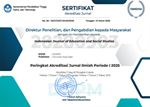Bal, F., Çokluk, G. F., & Savaş, E. (2025). Investigation of the Effectiveness of Short-Term Grief-Focused Group Intervention for 1st Degree Losses in Earthquake. Archives of Psychiatric Nursing, 55, 151852. https://doi.org/10.1016/j.apnu.2025.151852
Bembenutty, H., Kitsantas, A., & Mullen, C. A. (2024). Harnessing Motivation, Self-Efficacy, and Self-Regulation: Dale H. Schunk’s Enduring Influence. Educational Psychology Review, 36(4), 139.
Byrne, D. (2022). A Worked Example of Braun and Clarke’s Approach to Reflexive Thematic Analysis. Quality and Quantity, 56(3), 1391–1412. https://doi.org/10.1007/s11135-021-01182-y
Cho, Y., Grenier, R., & Williams, P. (2022). Introduction: Innovation in Qualitative Research in HRD. European Journal of Training and Development, 46(7–8), 685–692. https://doi.org/10.1108/EJTD-05-2022-0058
Davis, K. M., Nation, M., Christopher, C., & Fisher, B. W. (2024). The Role of Social Emotional Competencies in Student Discipline and Discipline Disparities. Journal of School Violence, 23(2), 250–263. https://doi.org/10.1080/15388220.2023.2297040
Espelage, D. L., Valido, A., & Poekert, P. E. (2021). Pilot Evaluation of K-12 School Security Professionals Online Training: Understanding Trauma and Social–Emotional Learning. School Mental Health, 13(1), 41–54. https://doi.org/10.1007/s12310-020-09399-2
Hahn, C., Lindkvist, E., Magnusson, D., & Johansson, M. (2025). The Role of Agriculture in a Sustainable Energy System – The Farmers’ Perspective. Renewable and Sustainable Energy Reviews, 213, 115437. https://doi.org/10.1016/j.rser.2025.115437
Hennink, M., & Kaiser, B. N. (2022). Sample Sizes for Saturation in Qualitative Research: A Systematic Review of Empirical Tests. Social Science and Medicine, 292, 114523. https://doi.org/10.1016/j.socscimed.2021.114523
Hill, G. M., Kawahara, A. Y., Daniels, J. C., Bateman, C. C., & Scheffers, B. R. (2021). Climate Change Effects on Animal Ecology: Butterflies and Moths as a Case Study. Biological Reviews, 96(5), 2113–2126. https://doi.org/10.1111/brv.12746
Hossain, M. R., Akhter, F., & Sultana, M. M. (2022). SMEs in COVID-19 Crisis and Combating Strategies: A Systematic Literature Review (SLR) and A Case From Emerging Economy. Operations Research Perspectives, 9, 100222. https://doi.org/10.1016/j.orp.2022.100222
Hsu, P. C., & Chen, R. S. (2023). Analyzing the Mechanisms by Which Digital Platforms Influence Family-School Partnerships Among Parents of Young Children. Sustainability (Switzerland), 15(24), 16708. https://doi.org/10.3390/su152416708
Jones, R., Kreppner, J., Marsh, F., & Hartwell, B. (2023). Punitive Behaviour Management Policies and Practices in Secondary Schools: A Systematic Review of Children and Young People’s Perceptions and Experiences. Emotional and Behavioural Difficulties, 28(2–3), 182–197. https://doi.org/10.1080/13632752.2023.2255403
Karatsiori, M. (2023). In the Pursuit of “Quality Education”: From Ancient Times to the Digital Era, Can There Be a Consensus? Cogent Education, 10(2), 2286817. https://doi.org/10.1080/2331186X.2023.2286817
Keemink, J. R., Sharp, R. J., Dargan, A. K., & Forder, J. E. (2022). Reflections on the Use of Synchronous Online Focus Groups in Social Care Research. International Journal of Qualitative Methods, 21, 16094069221095314. https://doi.org/10.1177/16094069221095314
Layton, M., Taylor, J., & Collins, D. (2023). The Measurement, Tracking and Development Practices of English Professional Football Academies. Journal of Sports Sciences, 41(18), 1655–1666. https://doi.org/10.1080/02640414.2023.2289758
Li, J. B., Bi, S. S., Willems, Y. E., & Finkenauer, C. (2021). The Association Between School Discipline and Self-Control From Preschoolers to High School Students: A Three-Level Meta-Analysis. Review of Educational Research, 91(1), 73–111. https://doi.org/10.3102/0034654320979160
Lungu, S. (2025). Teacher’s Perspectives on the Factors Contributing to School Violence Among High School Students in Mthatha: A Call for School Social Workers. Pakistan Journal of Life and Social Sciences (PJLSS), 23(1), 5611–5620. https://doi.org/10.57239/pjlss-2025-23.1.00438
Macenski, S., Foote, T., Gerkey, B., Lalancette, C., & Woodall, W. (2022). Robot Operating System 2: Design, Architecture, and Uses in the Wild. Science Robotics, 7(66), eabm6074. https://doi.org/10.1126/scirobotics.abm6074
Malhotra, R., Massoudi, M., & Jindal, R. (2023). Shifting From Traditional Engineering Education Towards Competency-Based Approach: The Most Recommended Approach-Review. Education and Information Technologies, 28(7), 9081–9111. https://doi.org/10.1007/s10639-022-11568-6
Mayer, M. J., Nickerson, A. B., & Jimerson, S. R. (2021). Preventing School Violence and Promoting School Safety: Contemporary Scholarship Advancing Science, Practice, and Policy. In School Psychology Review (Vol. 50, Issues 2–3, pp. 131–142). Taylor & Francis. https://doi.org/10.1080/2372966X.2021.1949933
Mitsea, E., Drigas, A., & Skianis, C. (2023). Digitally Assisted Mindfulness in Training Self-Regulation Skills for Sustainable Mental Health: A Systematic Review. Behavioral Sciences, 13(12), 1008. https://doi.org/10.3390/bs13121008
Moynihan, J. A., & O’Donovan, M. (2022). Learning and Teaching: The Extent to Which School Principals in Irish Voluntary Secondary Schools Enable Collaborative Practice. Irish Educational Studies, 41(4), 613–630. https://doi.org/10.1080/03323315.2021.1899019
Muñiz, J. O. (2021). Exclusionary Discipline Policies, School-Police Partnerships, Surveillance Technologies and Disproportionality: A Review of the School to Prison Pipeline Literature. Urban Review, 53(5), 735–760. https://doi.org/10.1007/s11256-021-00595-1
Obeidat, B. F., Haimed, S., & AlKhaza’leh, M. S. (2024). Students’ Well-Being and School Climate: A Bibliometric Analysis. Review of Education, 12(2), e3486. https://doi.org/10.1002/rev3.3486
Ozanne, R., Ireland, J. L., Ireland, C. A., & Thornton, A. (2024). The Impact of Institutional Child Abuse: A Systematic Review Using Reflexive Thematic Analysis. Aggression and Violent Behavior, 78, 101946. https://doi.org/10.1016/j.avb.2024.101946
Paat, Y. F., Yeager, K. H., Cruz, E. M., Cole, R., & Torres-Hostos, L. R. (2025). Understanding Youth Violence Through a Socio-Ecological Lens. Social Sciences, 14(7), 424. https://doi.org/10.3390/socsci14070424
Power, S., Bridgeman, J., & Taylor, C. (2024). Psychosocial Disorder or Rational Action? Contrasting Professional and Pupil Narratives of School Exclusion. Oxford Review of Education, 50(6), 817–833. https://doi.org/10.1080/03054985.2024.2373061
Pyo, J., Lee, W., Choi, E. Y., Jang, S. G., & Ock, M. (2023). Qualitative Research in Healthcare: Necessity and Characteristics. Journal of Preventive Medicine and Public Health, 56(1), 12–20. https://doi.org/10.3961/jpmph.22.451
Renjith, V., Yesodharan, R., Noronha, J., Ladd, E., & George, A. (2021). Qualitative Methods in Health Care Research. International Journal of Preventive Medicine, 12(1), 20. https://doi.org/10.4103/ijpvm.IJPVM_321_19
Ridwan, M., & Lalu Agus Satriawan. (2024). Implementation of Humanism Learning in Learning Islamic Religious Education in the Modern Era. Medina-Te: Jurnal Studi Islam, 20(1), 1–12. https://doi.org/10.19109/medinate.v20i1.23048
Schrödter, R., Noël, B., & Klatt, S. (2024). Game Management by Referees to Compensate for Errors in Judgement: A Decision Flow Model. International Journal of Sport and Exercise Psychology, 22(3), 612–631. https://doi.org/10.1080/1612197X.2022.2161105
Wallace, D., & Joseph-Salisbury, R. (2022). How, Still, Is the Black Caribbean Child Made Educationally Subnormal in the English School System? Ethnic and Racial Studies, 45(8), 1426–1452. https://doi.org/10.1080/01419870.2021.1981969
Zairul, M. (2021). Can Member Check Be Verified in Real Time? Introducing Arc (Asking, Record, Confirm) for Member Checking Validation Strategy in Qualitative Research. Engineering Journal, 25(1), 245–251. https://doi.org/10.4186/ej.2021.25.1.245

 (Open University of Mauritius)
(Open University of Mauritius) 



